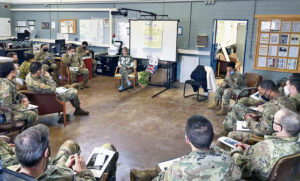
“Suicide may end their pain, but that pain transfers to surviving family and friends.”
Laura Roman, U.S. Army Garrison Rheinland-Pfalz risk reduction coordinator isn’t reading from a manual or syllabus. She is speaking from the broken heart of someone who lost a family member to suicide.
“My brother, an Air Force veteran who served in Afghanistan, a husband, a father, the life of the party, died by suicide in March 2019,” Roman said. “In May, I interviewed for this job.”
Roman’s job as risk reduction coordinator is self-explanatory. She’s in charge of finding and mitigating high-risk behavior in Soldiers and garrison employees. A lot of what she does is talk about suicide, alcohol abuse and other high-risk activities.
“When I told everyone I got this job, they just said, ‘It was meant to be,’” she said. “I feel like every day I’m putting it all together, honoring my brother, helping myself and, more importantly, helping other people.”
Roman said her experience with her brother’s suicide has given her a unique empathy for the people she comes in contact with on the job — whether it’s substance abuse, suicide ideation, gambling addiction, family issues or just whatever they want to talk about.
“I feel I am here to advocate for Soldiers who are struggling,” Roman said. “I have to be their voice. It is okay to not be okay, but people need to be comfortable expressing that. Getting help is the ultimate act of self-respect, knowing you deserve it.”
Roman does sensing sessions within units in the garrison footprint to find out what is bothering Soldiers, where their heads are and how they feel about the way their command team is handling situations. She then writes a report for the unit commander. She knows many Soldiers, even the youngest Soldiers, have experienced loss. It could be a battle buddy killed in action, a friend killed in a car accident or a family member dying by suicide.
Her first session was with a unit which had just lost two members in the last quarter of 2020. To help the unit, the entire Army Substance Abuse Program division began a series of TED Talk-type meetings which provided resiliency and coping tools for the Soldiers, according to Kristin James, USAG RP ASAP chief. However, ASAP personnel quickly realized what the Soldiers needed was an opportunity to discuss their grief as a group.
“Laura was involved with several sessions and identified a need which was not being met,” James said.
Roman volunteered to conduct a session and share her journey through the grief of her brother’s suicide. It was the first time she spoke about her brother as a way to gain the trust of the Soldiers.
“I’m here to help them, but I wanted them to open up to me and they won’t do that if I don’t share my story with them,” Roman said. “I wasn’t sure I wanted to, but I shared my story about my brother so they would understand where I was coming from.”
“I am overwhelmed by her bravery and courage,” James said. “I am amazed at her ability to harness her emotions and share her brother’s story in order to help Soldiers cope with their own grief and healing process.”
During those sessions, Roman uses cards with questions or scenarios written on them. Soldiers tell how they have encountered that scenario and how they reacted, or how they would react if they ever encountered that situation.
“As they answered, some voices cracked — there were tears,” she said. “After that exercise, everyone was talking. The unit leadership said the talk rattled them but also said it was badly needed for the whole unit.”
Every unit is required to do a Unit Risk Inventory at least once a year. It’s a 53-question anonymous survey which covers behaviors which could climb into the high-risk category.
“We get those results back and that helps us provide resources and classes to units to help fight high-risk behaviors,” Roman said. “Hopefully, we can identify those potential problems and help them before they end up on a police blotter or a coroner’s report.”
“As she continues to fulfill her duties as risk reduction program coordinator, her unique perspective on the risk factors associated with suicide will help commanders implement mitigation strategies unique to the needs of their Soldiers,” James added.
Units and directorates within the KMC and Baumholder can reach out to the Risk Reduction Office at 0631-3406-4903 or DSN 493-4903.


